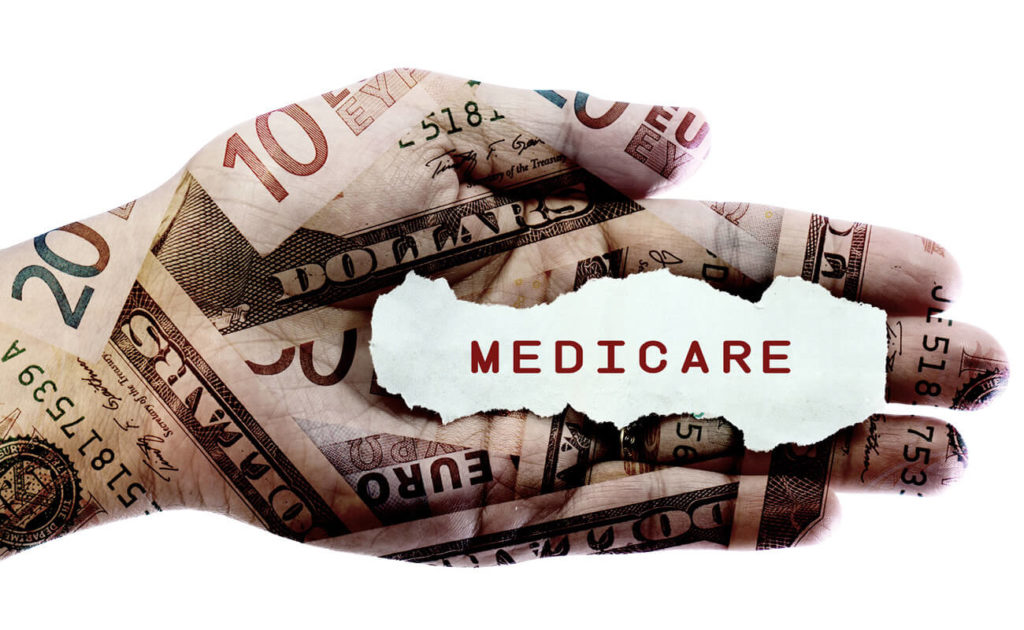The effects of Medicare fraud impact everyone involved with the Medicare billing process, but most importantly, they affect you, your health, and your wallet. So before we discuss how to identify fraud and how to prevent it, let’s talk about who is affected by Medicare fraud and the scope of how much it can cost you.
Medicare Fraud, By the Numbers
It’s difficult to pinpoint exactly how much money is wasted by Medicare fraud, specifically because there’s so much of it. The Council for Medicare Integrity, a non-profit, independent watchdog, predicted that in 2017 Medicare paid out about $36 billion—almost 10 percent of all Medicare payouts—in erroneous payments to medical providers around the country. This number includes billing errors and fraud, because it’s difficult to tell which billing errors were made intentionally or not. For 2018, the error rate was about 8 percent, resulting in about $31.5 billion in waste.
However, there is a team of people who seek out those committing fraud all around the country with the goal of recouping some of the lost billions of dollars paid out to Medicare claims. Medicare’s Fraud Strike Force has teams in major metropolitan areas like Miami, Los Angeles, New York City, and Philadelphia to help stop these schemes. Overall, there are more than a dozen teams that aim to “prevent and combat health care fraud, waste, and abuse,” according to the Strike Force’s website. They primarily focus on people who are intentionally improperly billing for services administered to the elderly, whether it’s claiming you received more services than you did, were prescribed certain drugs that you never filled, or other fraudulent activity.
The Medicare Strike Force Team operates under the Office of Inspector General, which is a branch of the Department of Health and Human Services. This is the same department that the Centers for Medicare and Medicaid Services is under. The Strike Force reports that they have caught more than 4,000 people who have improperly billed for more than $14 billion total since the initiative started in 2007.
Signs Of Medicare Fraud
Medicare fraud can reveal itself in many ways. The people committing fraud aren’t always some ominous, faceless criminals who somehow take your money without ever seeing or meeting with you. They can be doctors, nurses, insurance experts, and other healthcare providers. These people can extort you and the Medicare program out of thousands of dollars by administering services and prescribing drugs that aren’t necessary. But these bad actors can also contact you over the phone, via email, on message boards, and through other indirect ways that make it difficult for you to realize you’re being scammed.
It’s important to first understand that a billing error does not mean you are being scammed.
Some ways you can identify Medicare fraud include:
You Have A Billing Error:
It’s important to first understand that a billing error does not mean you are being scammed. Rather, you could be charged thousands more for services—or services you didn’t get at all—as the result of someone trying to commit fraud in your name. If you have a billing error, contact the service provider and your Medicare provider to figure out what happened.

You Need To Pay For A Bill Over The Phone:
One way scammers will try to get you is by pressuring you to pay for a bill over the phone. They may say that your coverage will be dropped if you don’t pay it. This isn’t true. If you suspect any issues with bills, as we’ve mentioned, contact your Medicare provider and sort out the issue.
Someone Asks For Personal Information Over The Phone:
Never give your Social Security number, bank account number, medical history, or other sensitive personal information to someone over the phone, especially if they are asking you to “confirm” the information that is already part of their “records.” You will not be contacted by the Centers for Medicare and Medicaid Services to update any information on your account. Scammers sometimes aren’t interested in your medical information at all, and they instead want you reveal important personal information so they can commit identity theft or Social Security fraud.
Tampering With Medicare ID:
In 2019, Medicare is changing Medicare cards so that they feature a randomized 11-digit code in place of your SSN. You may be contacted to replace your card, but this is free. You may be dealing with a scammer if they ask for money to replace the card, according to CNBC.
You’re Pressured By A Doctor To Get A Service You Don’t Know You Need:
There are doctors who try to scam their patients by saying they need treatments for conditions they don’t have. They do this in order to hike up the bill. While Medicare covers most of the bill, in many occasions you’re often left with payments on the back end of it. Second opinions are often covered by Medicare, so if you’re not sure whether you need a service or procedure, get a second opinion just to make sure you aren’t being scammed out of money for something you don’t need.
Once you’ve identified potential fraudulent activity, it’s time to report it.
How To Report Medicare Fraud

It’s vital to know the right steps to take once you suspect that someone may be committing Medicare fraud against you. There is no shame in being a victim of fraud.
The primary source you need to know is the Inspector General’s office. The Strike Force works under this office, and they will look into any claim of fraud. You can report fraud to the office via an online form that you can fill out here. You can also call them at 1-800-HHS-TIPS.
Be sure to include the following details on your report:
- The people or company you suspect committed the fraud
- The service in question
- How much Medicare covered of the service
- How much you’re being asked to pay or did pay
- The date of the service
The issue at hand doesn’t always need to be reported, though. Sometimes, the billing issues can be resolved simply by calling the provider’s office or your insurance company—mistakes happen. If talking the issue through with the provider doesn’t solve your problem and you still think you’re being scammed, then you should contact the Inspector General’s office.
If you fear the fraudulent activity in your name occured because of a case of stolen identity, you may also want to notify the Social Security Administration. They can flag your account to watch out for any suspicious activity regarding your SSN. Make sure to notify your banks, too, so they can watch out for any curious charges to your account related to health care costs.
Protecting Yourself From Medicare Fraud
While it’s important to know how to report fraud if you suspect it or if it actually happens to you, it’s best to know how to prevent fraud in the first place. Generally speaking, you should be skeptical of all billing. Medicare is there to cover services for you, so if you’re paying exorbitant costs each time you go to the doctor, this could mean that something is wrong. It doesn’t hurt to ask questions of all sides, from your medical provider to the Medicare system itself.

Here are some tips you can follow in your medical dealings:
Generally speaking, you should be skeptical of all billing. Medicare is there to cover services for you, so if you’re paying exorbitant costs each time you go to the doctor, this could mean that something is wrong.
Keep Your Medicare Card In Safe Place:
Your Medicare card has vital information on it. While the identification number is changing from your SSN to a randomized 11-digit number, it still has vital information such as your full name, birthday, and coverage. Treat this number like your SSN or bank account information. Only give it to trusted sources such as your primary care physician, people who they refer you to, and Medicare officials.
Keep Track Of Services You Received From Who And When:
Whenever you visit the doctor or fill a prescription, keep a receipt or invoice of the services or prescriptions you received. The receipt should be detailed to show you what you received, when you received it, and how much you paid for it. If the provider doesn’t offer one—or they make excuses to not give you one—that’s a cause for concern. A receipt will also help timestamp the date of your services, even if you paid for them later.
Confirm Exactly What Was Covered By Medicare And What Wasn’t:
If you have to pay for services—which often occurs through coinsurance, copayments, and deductibles—ask the medical provider which parts were covered by Medicare and which parts weren’t. Once the medical provider details that for you, if you suspect an issue or fraud, contact Medicare or your private Medicare insurer to see if the services rendered should have or shouldn’t have been covered. You can view a list of the services, items, and tests are covered under Medicare here.
Don’t Give Private Information Over The Phone Or Email:
Never give away your SSN number, your Medicare ID, bank account information, medical records, or any other sensitive information over the phone or email. If the situation described to you—like an update of medical records or the need for an immediate payment or else your coverage will be dropped—sounds dire, then ask for them to confirm multiple levels of information they should know about you, such as as your birthday and full name, before doing anything. From there, you can visit whoever you need to in person to fix the issue, if there actually is one.
Get A Second Opinion:
If you don’t think you need a certain service being offered, it’s okay to get a second opinion—these are often covered by Medicare, too. You shouldn’t be pressured into getting a procedure you’re not sure you need. A second opinion can help you determine if you should question the first doctor or not.
If you have any questions regarding Medicare fraud, contact the Centers for Medicare and Medicaid Services or the Office of Inspector General.
Do you want to cite this page? Use our ready-made cite template.
